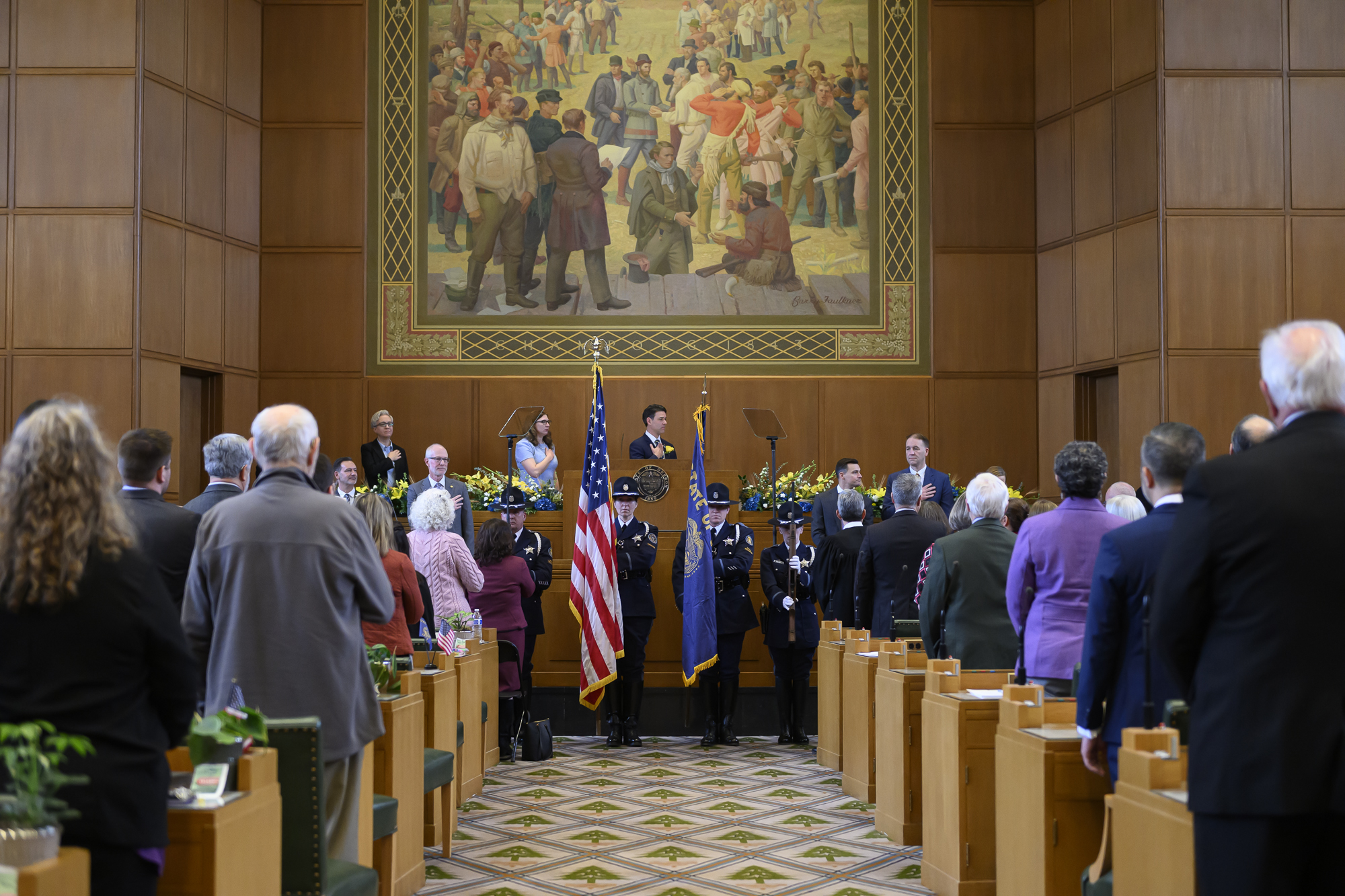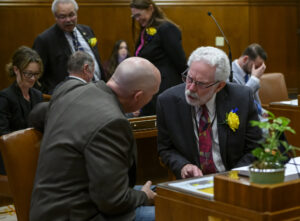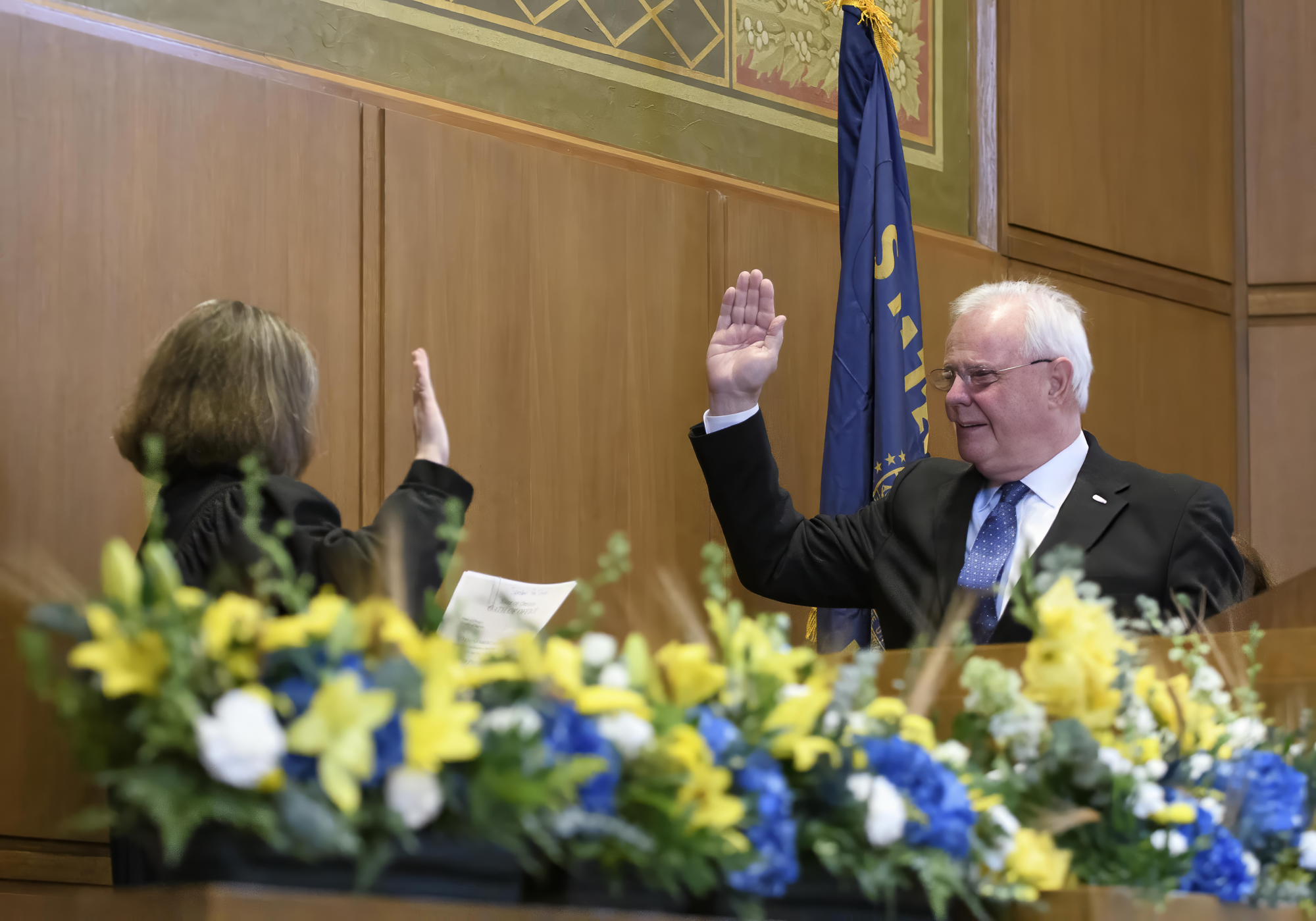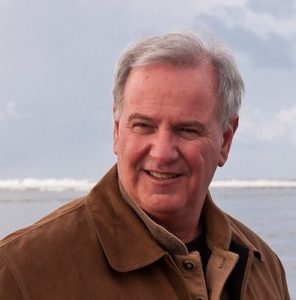
By MIKE McINALLY/YachatsNews
If the biggest issues facing the 2025 Legislature – transportation, housing, behavioral health, education funding, wildfires – seem familiar to you, Sen. Dick Anderson and Rep. David Gomberg sympathize.
“You may have noticed over time that legislative members never finish anything,” said Anderson, R-Lincoln City.
He’s joking. Sort of.
But Gomberg, D-Otis, sees it the same way.
“The big issues facing the state right now are the same issues that were facing the state when we convened a legislative session two years ago,” Gomberg said – housing and homelessness, health care, mental health, school funding, wildfire response, transportation.
Both Anderson and Gomberg represent all of Lincoln County and western portions of Benton and Lane counties. Anderson’s district also stretches south to Coos Bay.

In separate interviews with the YachatsNews, both legislators emphasized that those issues are big enough that it’s unrealistic to expect them to be solved in the two years between the state’s long legislative sessions, held in odd-numbered years.
“You can’t do it in a biennium and walk away,” Anderson said.
So it’s important, both said, for lawmakers to stay focused on the big issues during the 2025 session, which officially began Tuesday.
Gomberg said it’s also important to remember something else: Even though the housing shortage might be an important issue throughout the state, each region of the state faces different challenges.
For example, Anderson said, coastal communities trying to find room for new housing have a space problem that communities in central or eastern Oregon don’t share — a community on the coast, obviously, can’t grow to the west. And expanding to the east often isn’t an option either because of federally owned land or geography. Even growing to the north and south can be a challenge, thanks to wetlands or marshes.
A community with limited options for expansion might need to concentrate on infill housing. But that raises other questions: How does it fund the necessary infrastructure – water and sewer, for example — or find adequate municipal staff to handle permitting and other regulatory duties?
Both Anderson and Gomberg have focused in previous sessions on helping fund infrastructure projects in smaller communities – and said that focus will continue.
“I’ve worked hard the last couple of sessions on the infrastructure topic,” Gomberg said. “I’m a legislator who likes to build stuff. I particularly like to build stuff in my district, but to make that happen, I’m happy to coordinate with other legislators and get stuff built in their districts too, because when you’ve got five members pushing for a bill, it’s got a greater likelihood of success than if you just have one legislator pushing for it.”
Anderson said he wanted to try to find answers to a straightforward housing question: “How do we get more actual production of units?”
That’s the spirit behind one of his proposals for the session, a measure that would give local governments 45 days to respond to a building-permit application if the residence is in an area zoned for housing. Anderson also is the chief sponsor of a measure, Senate Bill 898, that would allow cities in need of housing to add a project area to their urban growth boundaries.

Transportation and super majorities
Details of the transportation package still are being worked out. Lawmakers need to come up with a plan to sustainably fund the state’s transportation needs as money from the gasoline tax dwindles.
Gomberg said he expects the eventual package will be “a combination of things” – increased registration fees, a mileage tax, possible new taxes on delivery companies such as Amazon and so on.
“And there may be tolling,” he said, “and a lot of parts of Oregon hate the idea of tolling. I’m in a part of Oregon where every third license plate is from out of state, and I would like those people to help pay for our roads too.”
Anderson already has a couple of transportation-related bills in the works. One, SB 571, requires the state to study road infrastructure as it relates to housing. Another, SB 564, would widen Highway 20 from Southwest 15th Street in Corvallis to Philomath.
Gomberg, who was elected speaker pro tempore of this House this session, noted that Democrats hold a supermajority in both chambers of the Legislature. That gives Democrats enough votes to raise taxes without a single Republican. But he doesn’t think it would be a good idea to do that.
“We need both parties,” he said. “We all need to work together on this major challenge facing our state, and I think it would be wrong for the Democrats to push something through – just as it would be wrong for the Republicans to let them and then sit back and poke criticism at them for all these new taxes.”
Anderson said: “It’s more up to the Democrats than it is the Republicans.”
Both Gomberg and Anderson emphasized that most work lawmakers tackle during the session is handled in a bipartisan way.
And both pride themselves on being able to work across the aisle. In fact, Anderson said he’s been successful at getting measures passed with just a sprinkling of votes from his Republican colleagues.
Lawmakers along the coast also have united in what’s called the “Coastal Caucus” — four House members and three senators whose districts border the Pacific. The idea, Anderson said, is to be “a good loud voice” for coastal communities, regardless of party affiliation.
Gomberg, who is chair of the caucus, said one of the reasons he’s happy with his ascension into House Democratic leadership is it gives him “an opportunity to advocate not just for our coastal concerns in the district, but also for rural Oregon and to have somebody in that room who is practiced at the art of working across the aisle.”
A key to the success of the session, both lawmakers agreed, is maintaining a focus on the biggest issues facing the state -– the ones that will take more than a session to fix.
As Anderson told a reporter: “I’m hoping for a very boring, long discussion about state government stuff – education, health care, infrastructure, housing. All the boring stuff that you guys don’t care about as writers. That’s what we’re hoping for.”
Bills in the hopper

Sen. Dick Anderson is listed as a chief sponsor of about three dozen measures so far this session. Here are highlights:
- Senate Bill 434 would direct some of the money from the state transient lodging tax into a fund to help manage state recreation areas along the ocean shore;
- SB 438 would allow the owner of property outside an urban growth area to locate an additional dwelling on the property for occupancy by a relative;
- SB 565 would require the state to study existing, expanding and establishing state campgrounds within 25 miles of the coast;
- SB 566 would maintain standard time year-round in Oregon, if California and Washington make the same change;
- SB 570 would increase the maximum percentage that a local government could impose on the sale of marijuana items; and
- HB 2304 would remove the requirement that net proceeds from the Oregon Lottery allocated to the County Fair Account cannot exceed $1.53 million.

Rep. David Gomberg is listed as a chief sponsor on 16 measures so far this session. Here are highlights:
- House Bill 2844 creates statewide preparedness offices in the state Department of Administrative Services and the Department of Public Safety Standards and Training and imposes duties on those offices relating to statewide coordination of emergency management;
- HB 2970 prohibits the use of dogs to hunt or pursue lynx or bobcats;
- HB 3187 clarifies the meaning of “because of age” for purposes of employment discrimination law. Gomberg said the bill would outlaw discrimination by age;
- Senate Joint Resolution 29 proposes an amendment to the state constitution to require a simple majority of each chamber of the Legislature to conduct business, as opposed to the current two-thirds requirement. The amendment would be submitted to voters; and
- Gomberg said he’s working on other measures, including one to limit the amount of information vehicles can collect about their drivers; one to require landlords to give tenants keys to their apartments, a response to the advent of keyless systems that require smartphones; and one to create an Oregon animal welfare trust that could help pay for low-cost spay-and-neuter operations and to help pet owners afford veterinary bills.
Anderson and Gomberg are co-sponsors on these bills:
- HB 2973 requires the state to study options for funding marine cleanup;
- HB 3140 provides that an operator of sports, fitness or recreational activities can require a participant to release the operator from claims for ordinary negligence; and
- HB 3149 allows for additional distribution of state money to wildfire-impacted school districts for an additional four years.
To contact Sen. Dick Anderson and his staff, go here
To contact Rep. David Gomberg and his staff, go here
- Mike McInally is a Corvallis freelance reporter and editor who has worked at newspapers in Oregon and Montana and can be reached at mcinallymike1@gmail.com




Wow, I am really proud of our representation here in Lincoln County. I wish both men success.
Excellent writing, thank you for the introduction to Gomberg and Anderson. I learned so much. Keep up the good work. From Bandon, Ore.